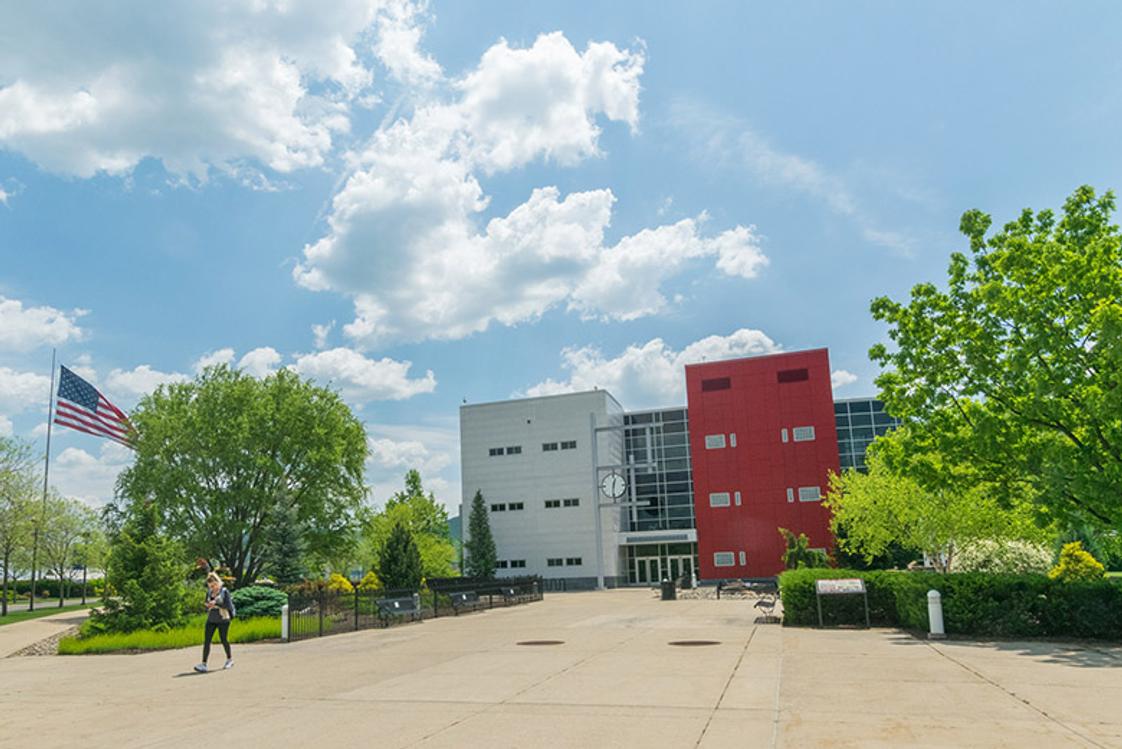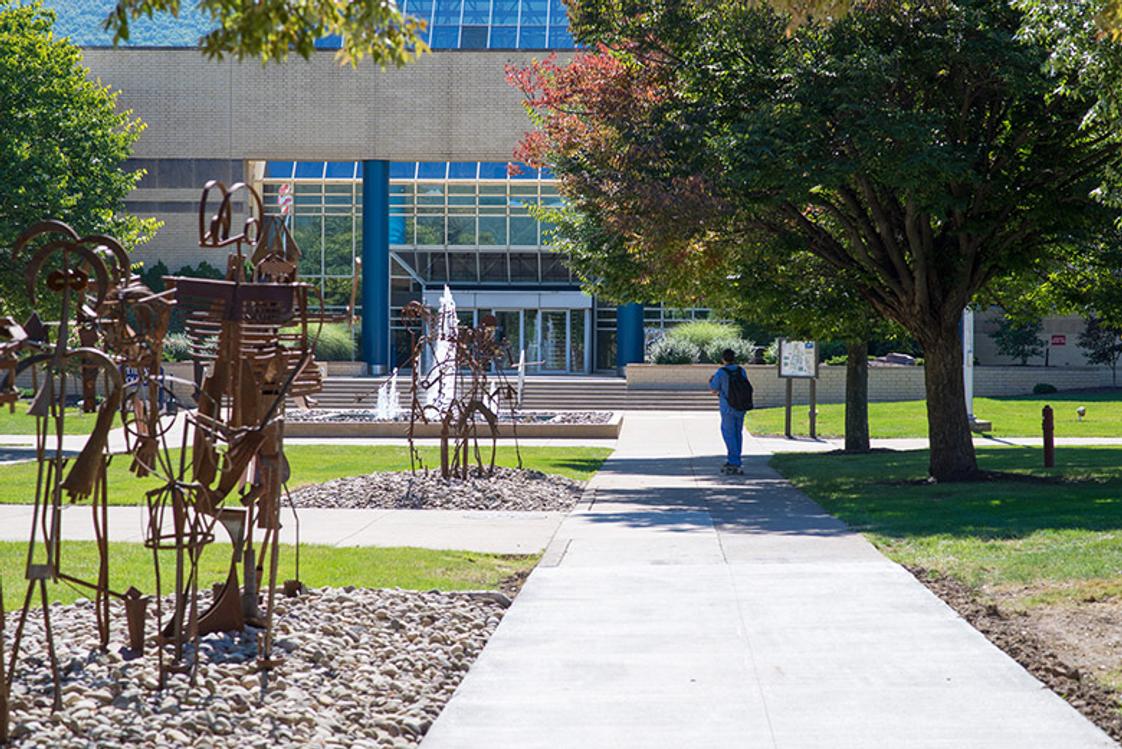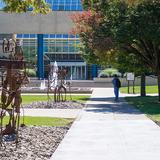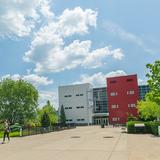- Pennsylvania College of Technology, a special mission affiliate of Penn State, is a national leader in applied technology education. Penn College offers more than 100 bachelor, associate, and certificate majors to nearly 5,600 students in careers ranging from manufacturing, design, transportation, and construction to hospitality, health, business, and natural resources. Business/industry connections, small classes, industry-standard equipment, and faculty with work experience contribute to strong graduate placement rates. The full college experience awaits those desiring on-campus housing, Greek Life, student organizations, and NCAA Division III athletics.
School Highlights
Pennsylvania College of Technology serves 6,277 students (58% of students are full-time).
The college's student:teacher ratio of 16:1 is higher than the state community college average of 15:1.
Minority enrollment is 17% of the student body (majority Hispanic), which is less than the state average of 48%.
Quick Stats (2025)
- Enrollment: 6,277 students
- In-state tuition: $17,610
- Out-state tuition: $26,415
- Acceptance Rate: 72%
- Student:teacher ratio: 16:1
- Minority enrollment: 17%
- Source: Verified school update
Top Rankings
Pennsylvania College of Technology ranks among the top 20% of public schools in Pennsylvania for:
School Overview
The teacher population of 385 teachers has declined by 5% over five years.
Pennsylvania College of Technology
(PA) Community College Avg.
Carnegie Classification
Baccalaureate/Associate's Colleges: Mixed Baccalaureate/Associate's
Not applicable, not in Carnegie universe (not accredited or nondegree-granting)
Institution Level
Four or more years
At least 2 but less than 4 years
Institution Control
Public
Private not-for-profit
Total Faculty
385 staff
59 staff
Number of Programs Offered
148
29
School Calendar
Student Body
The student population of Pennsylvania College of Technology has grown by 37% over five years.
The student:teacher ratio of 16:1 has increased from 11:1 over five years.
The Pennsylvania College of Technology diversity score of 0.30 is less than the state average of 0.68. The school's diversity has grown by 34% over five years.
Total Enrollment
6,277 students
461 students
Student : Teacher Ratio
16:1
15:1
# Full-Time Students
3,632 students
325 students
# Part-Time Students
2,645 students
136 students
# Enrollment Undergraduate
625 students
298 students
# Full-Time Undergraduate Students
3,615 students
326 students
# Full-Time Graduate Students
17 students
10 students
# Part-Time Undergraduate Students
2,637 students
151 students
# Part-Time Graduate Students
8 students
12 students
Total Dormitory Capacity
n/a
330 students
% American Indian/Alaskan
n/a
n/a
% Asian
1%
5%
% Hispanic
6%
11%
% Black
4%
15%
% White
83%
52%
% Hawaiian
n/a
3%
% Two or more races
3%
3%
% Non Resident races
n/a
1%
% Unknown races
3%
10%
Diversity Score
0.30
0.68
College Completion Rate (Students who graduate in less than 4 years)
n/a
60%
College Completion Rate (Students who graduate in 4 years or more than 4 years)
49%
36%
Average Graduate Earnings (10 Years)
$43,200
$34,900
Tuition and Acceptance Rate
The public in-state tuition of $17,610 is more than the state average of $11,723. The in-state tuition has stayed relatively flat over four years.
The public out-state tuition of $26,415 is more than the state average of $15,818. The out-state tuition has stayed relatively flat over four years.
In-State Tuition Fees
$17,610
$11,723
Out-State Tuition Fees
$26,415
$15,818
Tuition Notes
Full-year, 30 credits.
% Students Receiving Some Financial Aid
84%
88%
Median Debt for Graduates
$24,000
$13,000
Median Debt for Dropouts
$9,040
$6,260
Acceptance Rate
72%
78%
SAT Reading
n/a
460
SAT Math
n/a
470
SAT Writing
n/a
435
ACT Composite
n/a
20
ACT English
n/a
20
ACT Math
n/a
21
ACT Writing
n/a
7
Sports
Total Sports Offered
9 sports
Sports
Baseball, Basketball, Cross Country, Golf, Soccer, Softball, Tennis, Volleyball, Wrestling
Extracurriculars
Total ExtracurricularsTotal Extra-curric.
16 extracurriculars
ExtracurricularsExtra-curric.
Club or Organization:
https://www.pct.edu/campuslife/studentactivities/organizations.htm
Recreational Athletic Programs:
and Kick, Intramural Basketball, Intramural Dodgeball, Intramural Flag Football, Intramural Indoor Soccer, Intramural Indoor Volleyball, Intramural Kickball, Intramural Powder Puff Football, Intramural Punt, Intramural Sand Volleyball, Intramural Slow Pitch Softball, Intramural Tennis, Intramural Ultimate Frisbee, Intramural Wiffleball, Pass
https://www.pct.edu/campuslife/studentactivities/organizations.htm
Recreational Athletic Programs:
and Kick, Intramural Basketball, Intramural Dodgeball, Intramural Flag Football, Intramural Indoor Soccer, Intramural Indoor Volleyball, Intramural Kickball, Intramural Powder Puff Football, Intramural Punt, Intramural Sand Volleyball, Intramural Slow Pitch Softball, Intramural Tennis, Intramural Ultimate Frisbee, Intramural Wiffleball, Pass
Source: 2024 (or latest year available) Integrated Postsecondary Education Data System (IPEDS) , School Administrators
Frequently Asked Questions
How much does Pennsylvania College of Technology cost?
Pennsylvania College of Technology's tuition is approximately $17,610 for In-State students and $26,415 for Out-State students.
What is the acceptance rate of Pennsylvania College of Technology?
The acceptance rate of Pennsylvania College of Technology is 72%, which is lower than the state average of 78%.
What sports does Pennsylvania College of Technology offer?
Pennsylvania College of Technology offers 9 interscholastic sports: Baseball, Basketball, Cross Country, Golf, Soccer, Softball, Tennis, Volleyball and Wrestling.
What is Pennsylvania College of Technology's ranking?
Pennsylvania College of Technology ranks among the top 20% of community college in Pennsylvania for: Largest student body and Most Programs Offered.
Recent Articles

Debating Your Way to Career Success: The Hidden Benefits of Joining a Community College Debate Club
This article highlights three key reasons why joining a debate club in community college can significantly boost career prospects. It explores how debate activities enhance public speaking skills, critical thinking abilities, and networking opportunities, all of which are valuable assets in the job market.

Community Colleges Nationwide Joining in President Obamas Interfaith and Community Service Campus Challenge
Learn about the number of colleges joining the President’s Interfaith and Community Service Campus Challenge, which was introduced by the White House this past spring.

Careers: Customs Broker/Freight Forwarder/Logistics
Explore the dynamic world of customs brokerage and freight forwarding, where precision meets strategy in global logistics. This article delves into the critical role of customs brokers and freight forwarders, who navigate complex regulations and ensure the smooth transit of goods across international borders. Discover the skills and expertise required to excel in this field, from understanding tariff codes to managing documentation and customs clearance. Learn about the impact of these professionals on supply chain efficiency and the opportunities available in this growing industry.















